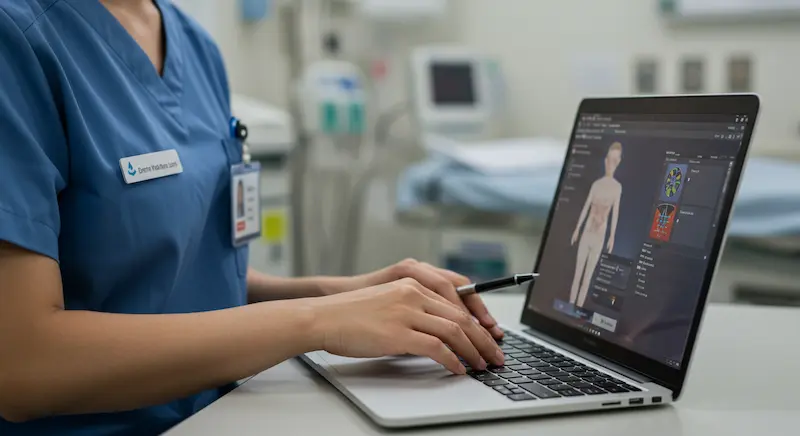In 2025, IT healthcare consulting quietly reshaped how hospitals run, how doctors deliver care, and how patients experience the system, without most of us realizing it. Behind the scenes, consultants redesigned technology and workflows to make healthcare smarter, faster, and safer than ever before.
The Quiet Force Powering Modern Healthcare
The healthcare system you experienced in 2025 didn’t just evolve – it was carefully redesigned. And at the heart of that transformation was IT healthcare consulting.
Most people didn’t notice it happening. After all, there were no breaking news segments about digital workflows or upgraded data encryption. However, while patients and providers went about their routines, IT consultants worked behind the scenes to modernize every layer of the care experience.
That meant more than just adding new software. Consultants guided a comprehensive digital transformation, ensuring that systems across departments worked together, data stayed protected, and digital tools were designed around the real needs of clinicians and patients.
From enhancing electronic health records (EHRs) to supporting artificial intelligence (AI) initiatives, IT healthcare consulting has become essential to the functioning of modern healthcare. Yet its rise has mainly remained invisible because when tech works well, it fades quietly into the background.
The Role of the Healthcare IT Consultant
So, what exactly do IT healthcare consultants do?
In simple terms, they assist hospitals, clinics, and healthcare networks in planning, implementing, and managing the digital systems that support patient care. They’re part strategist, part project manager, part technology expert, and always focused on one goal: making healthcare delivery more efficient, secure, and user-friendly.
Whether it’s upgrading an outdated patient portal or designing a custom data integration between systems, consultants tailor solutions to match both clinical and administrative needs. They don’t just install tools – they ensure those tools address the correct problems.

How IT Healthcare Consulting Quietly Transformed the System
Behind the Systems You Use Every Day
By 2025, the work of IT healthcare consulting firms had become woven into nearly every touchpoint of the care experience, without most people even realizing it.
Some of the most critical consulting services included:
- System Integration: Hospitals rely on dozens of digital systems, such as records, scheduling, and billing, that often fail to communicate effectively. Consultants integrated these tools into seamless workflows, allowing data to move without friction.
- EHR Modernization: Many organizations were still using outdated or clunky EHR systems. Consultants helped implement smarter, cloud-based platforms with better usability, mobile access, and clinical decision support.
- Data Security: With cyberattacks targeting healthcare systems, consultants strengthened data protection with encrypted storage, multi-layer authentication, real-time monitoring, and secure cloud infrastructure.
- AI Implementation: From diagnostic tools to predictive analytics, consultants helped organizations safely adopt AI and automation. That included selecting tools, training staff, and ensuring compliance with ethical and clinical guidelines.
- Compliance and Regulatory Support: Consultants kept hospitals aligned with changing regulations like HIPAA and data-sharing mandates by building systems that met legal, technical, and operational standards.
Visible Results from Invisible Work
What did all this mean for the average user?
Without knowing it, patients experienced the impact of IT healthcare consulting in countless ways. Booking appointments online was quicker. Telehealth visits were smoother. Lab results arrived faster. Communication with providers was clearer and more convenient.
Hospitals, meanwhile, began using predictive analytics to manage staffing and identify high-risk patients before conditions worsened. Doctors accessed real-time records from any device. Nurses received alerts customized to clinical urgency, not just routine reminders.
And most importantly, hospitals experienced fewer data breaches or system failures. Consultants had helped build more resilient and secure infrastructures, reducing downtime and protecting patient trust.
How Healthcare Became More Connected, Seamless, and Secure
Technology That Just Works – Because It Was Designed To
By mid-2025, many patients had come to expect a digital-first experience when dealing with healthcare. From their point of view, healthcare had simply caught up with the times.
But it wasn’t accidental.
Consultants were behind every “it just works” moment. They assessed what wasn’t functioning, mapped a solution, implemented new systems without disrupting care, and trained staff on how to use them effectively.
For example:
- Patient portals that load instantly and sync across devices? Designed and optimized by IT consultants.
- Telehealth platforms that integrate directly with EHRs? Scoped, selected, and implemented by consultants.
- AI-powered triage alerts that help clinicians prioritize care? Built in collaboration with consulting teams who understood both medicine and machine learning.
All of this work happened without fanfare, but it was vital to reshaping how healthcare works at every level.

Improved Care Without Added Complexity
One of the best outcomes of healthcare IT consulting in 2025 was that technology stopped being a burden. Before, digital systems often created friction: too many platforms, too many clicks, too little coordination.
Now, with consultants streamlining infrastructure, providers could focus on patients, not paperwork. And patients could manage their health without fighting clunky tools or slow systems.
Administrative teams saw benefits too: fewer manual processes, better data visibility, stronger compliance. IT departments were able to shift from firefighting outages to strategically growing infrastructure.
Healthcare became more efficient, more secure, and more human-centered because consultants ensured the systems were aligned with real-world workflows.
Recapping the Impact: The Unsung Heroes of 2025’s Healthcare
IT healthcare consulting firms didn’t ask for credit, but they earned it.
They worked behind every patient portal that responded instantly. Behind every EHR system that made it easier to find test results, every telehealth visit that didn’t drop halfway through, every day that went by without a ransomware breach or system shutdown.
In short, they were the unsung heroes of healthcare’s digital transformation in 2025.
If you’ve experienced better, faster, or more reliable healthcare in the past year, there’s a strong chance an IT healthcare consulting firm had something to do with it.
These firms don’t just support healthcare, they shape it. And as new technologies, threats, and expectations emerge, their role will only grow more critical.
Stay Curious About the Systems Behind Your Care
Healthcare today feels different – more connected, more accessible, and more immediate. And yet, few people stop to think about what made those changes possible.
The next time you:
- Book an appointment in under a minute
- Message your doctor through a clean, easy portal
- Join a video visit without technical issues
- Get test results in real time
Pause and ask: Who built the system that made that happen?
Chances are, it wasn’t just the app developers or hospital admins. It was a healthcare IT consulting team that evaluated what was broken, found a better way, and quietly made it real.
So stay curious. While you may never meet them, these consultants are shaping the future of care, one wise decision at a time.
Better healthcare doesn’t just evolve. It’s engineered. And IT healthcare consulting is how it’s done.




